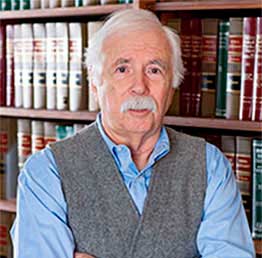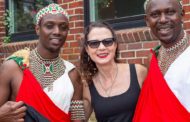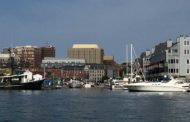By Cameron Autry
Pillars of Portland is a monthly column celebrating local leaders and doers. This month we celebrate Orlando Delogu who is a founding member of the Maine chapter of the ACLU.

Portland enjoys the reputation of being a city open to everyone – regardless of religion, race, or sexual orientation. This position wasn’t always the case, and we owe much to the people that built this reputation and placed Portland on the map of forward-thinking cities.
One prime example is Orlando Delogu, Emeritus Professor of Law at the University of Maine Law School and founding member of the Maine chapter of the American Civil Liberties Union (ACLU).
Defending ‘counterculture’
Delogu, originally from New York City, arrived in Maine in the mid-1960s, during the height of the cultural tension that defined that decade. He quickly joined the faculty of the University of Maine Law School, and his attention began to shift from environmental and land use concerns – his primary areas of study – towards the heavy discrimination that minorities, Vietnam War dissenters, and individuals deemed “counterculture” experienced.
“You’re reading about this stuff going down every day,” said Delogu. “This kid is booted out of school for two years because he’s got long hair. This teacher was part of an anti-Vietnam War rally and she’s threatened.”
Soon these victims of discrimination began to phone the law school asking for help. Delogu, who had already gained a reputation as an outspoken advocate for the environment, started taking these calls, and he, along with a network of concerned professors, attorneys, and other professionals took action.
Founding the MCLU
“We looked around and we realized or came to realize that [out of] 50 states, 47 of them had branches of the American Civil Liberties Union,” Delogu reflected. “Three states didn’t. Maine was one of the three. And we said something ought to be done.”
The ACLU is well known today. Although a polarizing institution for some, the ACLU was founded to ensure the rights granted by the Constitution are enjoyed by every individual in the United States. According to the ACLU’s website, their mission “remains realizing the promise of the Bill of Rights for all and expanding the reach of its guarantees to new areas.”
The Maine chapter of the ACLU officially incorporated in 1967. Delogu served as the second president of the organization from 1969 to 1971, before assuming a role on the board of the national ACLU in 1971.
Originally called the Maine Civil Liberties Union (MCLU), the group provided legal counsel, support, and advice for ethnic minorities, political dissidents facing workplace harassment, men that hoped to avoid the draft, among a longer list of disenfranchised groups during the time.
For the first five years of its existence, Delogu was tirelessly active in the MCLU, playing a key role in hiring the first Executive Director, securing office space, and growing membership.
The “ACLU of Maine has never shifted from Portland, and it’s grown from 150 members to close to 5,000,” said Delogu.
But after a half decade firmly embedded in the MCLU, Delogu began to take a step back and focus on other concerns – mostly land use and environmental concerns – as the organization had become both sustainable and effective.
Land Use & the Environment
“To the exclusion of other things, I’ve been an advocate of housing issues and an advocate of all sorts of environmental concerns,” said Delogu. “I would say land use [and] environment is where I’ve spent the lion’s share of my time.”
Delogu went on to assume dozens of different roles as an advisor, consultant, and board member of numerous organizations. Notable examples include serving as the Governor’s appointee to the State of Maine Board of Environmental Protection from 1969 to 1974; serving as a consultant for the Manufactured Housing Association and Institute from 1972 to 1982; and, at the request of the State Department, traveling to Thailand in 1991 to assist the Thai Government in tackling various environmental issues. He remained a full time Professor of Law until 2006.
Service to Portland
In 1994, Orlando Delogu was elected to the Portland City Council where he completed one term. From 2000 to 2005, he served on the Portland Planning Board.
Never shy, Delogu has written hundreds of op-eds in various local publications – including over 100 op-eds in the West End News between 2007 and 2012. Delogu’s voice still makes an appearance in the Portland Press Herald from time to time.
“I think the greatest struggle we’re going to face in the years coming is the disparity between the one percent and the 99 percent,” said Delogu, who always keeps an eye focused on land use. “Look at the pressures that Portland exposes itself to in terms of the persuasion that developer groups have at the local level of government, at the state level, at the national level.”
Maine Beaches Are Public
In 2017, Delogu released his latest book, titled “Maine’s Beaches Are Public Property,” which argues that under the correct interpretation of the law, all of Maine’s beaches should be considered public land, free for everyone to enjoy.
The book contends the rulings in the Bell Cases from the late 1980s, when a group of 45 beachfront cottage owners – primarily from Massachusetts – successfully sued the town of Wells and the state of Maine to prohibit the public from using the beaches in front of their properties for recreational purposes.
Orlando Delogu maintains an office off St. John Street where he works four to five hours every single day.
“I will still look for solutions to problems,” said Delogu, sitting in his office surrounded by law books and newspaper clippings, with a subtle hint of hope, optimism, and assurance in his voice.
Cameron Autry is a freelance writer and the host of The Southern Maine Report podcast.




